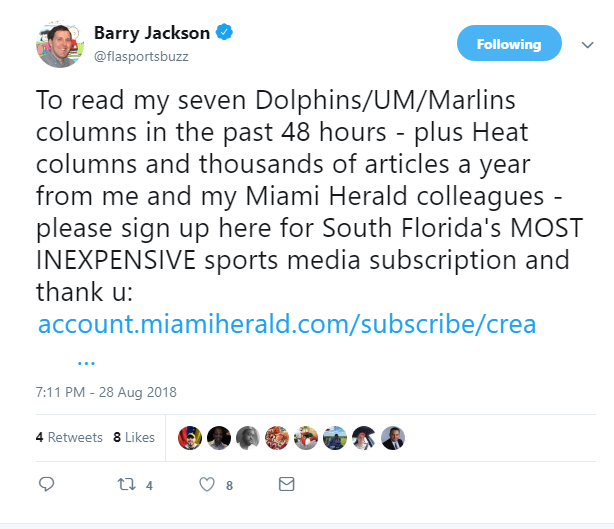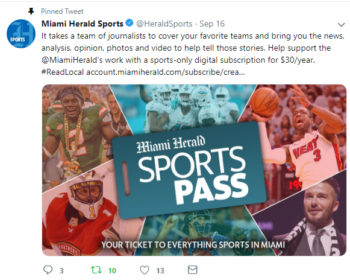How the Miami Herald created a sports-only subscription plan to lure out-of-market readers
Rick Hirsch, Adrian Ruhi, The Miami Herald,This is a series on Better News to a) showcase innovative/experimental ideas that emerge from the Knight-Lenfest Newsroom Initiative and b) to share replicable tactics that benefit the news industry as a whole. This “win” comes from Rick Hirsch, managing editor, and Adrian Ruhi, growth editor, of the Miami Herald.
API and the Solution Set from the Lenfest Institute for Journalism teamed up to take a deeper look at the Miami Herald’s experience with transforming itself. Here, you can learn more about how the Herald thought about targeting specific audiences for sports coverage and promoted the work to readers. Over at the Solution Set, you can read about how the newsroom helped drive the effort.
Question: What problem were you trying to solve, and why was solving the problem strategically important for your organization?
Answer: Fans of Miami’s sports teams — especially the Miami Dolphins (NFL), Miami Heat (NBA) and the University of Miami Hurricanes — were among the Herald’s most loyal readers. But many, especially those who lived outside of South Florida, were unwilling to subscribe since they were uninterested in reading about anything outside of sports.
It was important to solve the problem because these habitual readers were literally telling us on social media that they were willing to pay us, but only for sports content. Our sports reporters first proposed the idea, because their readers were telling them: We’d pay for your stories, but we don’t want all of that other stuff. Make us a deal.
So we had to find a way to do it.
Q: How is this approach related to Table Stakes (e.g. one of the 7 Table Stakes and/or an outgrowth of the Knight-Lenfest initiative, etc.)?
A: The two Table Stakes that stood out the most were No. 1, “Serve targeted audiences with targeted content,” and No. 5, “Diversify and grow the ways you earn revenue from the audiences you build.” We had to learn to quickly adapt to what our sports readers wanted and, in the process, create a new tier of subscribers.
Q: How did you go about solving the problem?
A: The problem required bringing together various stakeholders: the sports editor, the executive and managing editors, the regional editor, and growth and social media editors in the newsroom, as well as members of McClatchy’s audience, product and design teams. The newsroom coordinated with the audience team to determine whether sports content could be fenced off for its own subscription. The audience team helped pinpoint the right price point. The product and design teams created a landing page to promote Sports Pass, and the growth team helped create campaigns to promote the subscription offer on social media and on stories. From idea to launch, we were able to get Sports Pass up and running in two weeks.
Q: What worked?
A: The price point: $30 for the first year was less than a full Miami Herald digital subscription (a full subscription is $129.99 a year, or $12.99 a month). The price point was also slightly less than The Athletic, which launched in Miami a few weeks after Sports Pass.
The timing: Sports Pass, which is a yearly subscription, launched right before the start of football season, when our sports readership is often at its highest.
Reporter buy-in: Sports reporters and columnists were eager to promote Sports Pass, both on their social media accounts, as well as with embedded subscription buttons on their stories. Armando Salguero, the Herald’s Miami Dolphins columnist, wrote a short appeal asking readers to subscribe.

Barry Jackson and other Miami Herald sports reporters periodically tweeted out Sports Pass subscription links and pinned them to the top of their Twitter profile pages.
Out-of-market subscriptions: About 80 percent of Sports Pass subscribers are outside of South Florida. Sports Pass has created a unique opportunity to get subscribers outside of the local market.
Recirculation: Recirculation is the measurement of the percentage of users who read more than one story in a site visit. Since August, the percentage among non-Sports Pass readers who read more than one story during a visit has been about 26 percent. But during the same time, the rate among Sports Pass subscribers has been about 65 percent. Recirculation for subscribers with full website access has been about 55 percent.
Q: What didn’t work?
A: Miami’s sports teams. Winning teams drive audience. Sadly, the Dolphins, Hurricanes and Heat all had disappointing seasons. With enthusiasm down among fans, it became harder to market a sports subscription to our readers.
Q: What happened that you didn’t expect?
A: We saw an organic jump in Sports Pass subscribers on Dec. 31, 2018, when the University of Miami’s football coach stepped down, and on Jan. 1, 2019, when the Miami Dolphins fired their coach. Our assumption was that it would be easier to get subscribers when teams are playing well, but this showed that readership (and propensity to subscribe) could also be high during extremely low points for teams.
Q: What would you do differently now? What did you learn?

The @HeraldSports Twitter account keeps a tweet pinned to the top of its profile page explaining what the Herald’s sports coverage includes and asking readers to help support that work with a Sports Pass subscription.
A: We would have a more coordinated campaign to market Sports Pass, beyond just the social media posts and in-story subscription buttons.
Q: What advice would you give to others who try to do this?
A: Make sure a sports-only (or other niche) subscription offer is clearly available for readers to see. Make sure readers hitting the paywall on sports stories are seeing the sports offer. We weren’t doing that originally with Sports Pass but will be implementing it in the near future.
Q: Anything else you want to share about this initiative?
A: We think we made a good move by making Sports Pass a yearly, pay-in-full subscription, rather than monthly. We think this will pay off when football teams begin practice again, and a large proportion of these subscriptions come up for renewal. Sports fans are optimists, and we want to be re-selling them when hope springs eternal.
